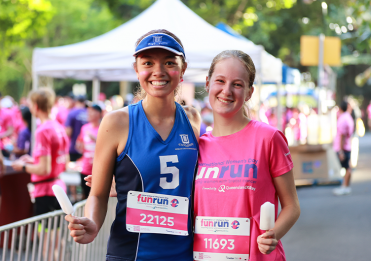Grammar girls are proud of the well-established culture of sisterhood at the School. In creating the 2021 Student Council motto, ‘When the sisterhood unites, the royal blue shines bright’, the Year 12 cohort chose to define ‘sisterhood’ as the solidarity of people based on shared conditions, experiences, and a sense of belonging. At the time, they were yet to realise how the conversation around women in society would evolve.
This week, our Year 12 Student Council were joined by Brisbane Grammar School’s prefect body at the annual BGGS and BGS Student Leaders Breakfast, which was an opportunity for students to meet, forge closer relationships, and discuss further possibilities for connection.
Head Girls, Victoria Chen (12O) and Sophie McLeod (12M) officially opened the event:
Today, we start with the end in mind. We want to set the tone that we are here as equals. So, whether we are discussing possibilities for Bi-Grammar, or the current state of societal matters of gender and discrimination, whether it be our cohort, or our generation—we are part of humanity. We want to be united, and we want to support each other. And, moving forward into the future, we each need to respect one another, and together, we need to forge ahead to make our schools, our community, and our world, a better place.
Guest speaker and BGGS alumna, Chloe Yap (2013), challenged students to think about how they can be advocates and overcome insecurity to persist through resistance, and approach contrasting perspectives with kindness and a desire to understand.
The BGGS Student Council look forward to initiating further strategic interactions with BGS to engage with and genuinely connect with one other throughout the remainder of the year.
Mrs Emma Lowry
Dean of Students
Grammar woman and recipient of The Lady Lilley Gold Medal for the Dux of the School, Chloe Yap (2013), presented the following address at the BGGS and BGS Student Leaders Breakfast on Monday 29 March.
Good morning, I’m Chloe Yap. I graduated in 2013, and I’m a medical student and PhD candidate in psychiatric genomics. There’s a lesson there about not necessarily sticking with your Year 12 plans!
I’ve been asked to talk about leadership. That’s a big topic. And it’s never really defined.
- We see people in leadership positions. Some do a great job. Some … don’t, as we’ve seen with the current Parliament House allegations. Can we really call that leadership?
- In my Student Council days, we spent a lot of time organising events. Is that leadership, or management?
- We saw women and their allies rallying for change throughout Australia on Thursday 4 March. Is advocacy leadership? How about when that advocacy occurs behind the scenes? A student bringing an issue to a staff member, an employee to their boss?
- Then there are some people who have this magnetic pull on others. They’re role models, but are they leaders?
I see leadership as the process of influencing people towards an overarching aim. Position, management, advocacy, and role modelling are activities to get you there. I’m going to talk about each and what you can do, giving examples from my secondary school hobby horse: recycling. In my current work to help build the clinician-scientist workforce, the same principles apply.
- Position gives you a platform and a voice.
- I joined Student Council for that platform. I got fired up about recycling when I realised that classroom conversations on climate change were inconsistent with having one recycling bin in the entire school. I would cart my recyclables there and passive-aggressively guilt-trip my friends to follow. We needed to scale up, and as a social media hermit with email as my only bridge to the world, I needed a platform.
- Management skills are the nitty gritty things that get projects done and events running to bring people together.
- For recycling, we had three trials. Bin stickers didn’t stick, the wire baskets failed when the Facilities staff found possums inside them. For the third attempt, we went back to the drawing board for something you couldn’t miss. Cue cyto-purple and yellow wheelie bins, and an absurd Assembly skit launch including singing ‘Colours of the Bins’ and girls jumping out of them.
As student leaders, school gives you position and management skills. But advocacy and role modelling are in your court.
- Advocacy involves pushing the boundaries to make things better.
- Step 1 is recognising something needs to change. There’s a lot swirling around now, so you don’t have to look far!
- Step 2 is mobilising people, because you can’t do it on your own.
- It starts behind the scenes. Before the introduction of the bins, there were lots of meetings with key people—Mrs Harvey-Short, Mrs Mungomery, Stores, Student Council, GECO.
- Then we coordinated a publicity surge with a core message of empowerment: that environmental change starts from cumulative, everyday actions like putting something in the right bin.
- I formed alliances to spread the message. The Head Girls and Service and GECO captains amplified the message at the School level. House Captains were important as they have a bigger influence on smaller groups.
-
- Step 3 is keeping the flame alive: you need to think bottom-up with a cultural shift, and you need a top-down succession Otherwise your efforts go to waste.
- This meant fresh publicity to keep it on the radar, maintaining messaging through other Student Councillors, and more personal guilt-tripping.
- After graduating, I returned to talk to Year 11s, wrote in BGGS News, and lobbied the Head Girls over the entire next year.
- Step 3 is keeping the flame alive: you need to think bottom-up with a cultural shift, and you need a top-down succession Otherwise your efforts go to waste.
- Advocacy has its challenges:
- Sticking your neck out is hard because we’re insecure. It delayed recycling by a year—I didn’t want to be ‘that recycling girl’. The truth is that everyone is focused on their own insecurities, so no one cares about yours. In fact, doing something a bit ‘out there’ gives others courage. So just do it.
- You’ll meet resistance. Resistance is trumped by persistence. Recycling failed twice before we got it right. There were also girls who still refused to recycle. You’ve got to keep at it.
- Advocacy is this balance of having strong views yet bringing together people who mightn’t share those views. You need productive relationships. And all good relationships are based on kindness. Everyone wants to be heard, so give others that chance and put aside your differences rather than reflexively pigeon-holing them as irrelevant or unworthy.
- Finally: role modelling. Leadership is influence, and role modelling is immediate influence. You can’t just ‘decide’ to be a role model, people choose their role models based on who they respect—kind of like ‘the wand chooses the wizard, Harry’. Respect comes from trust, trust comes from integrity, and integrity is built upon the cumulative weight of your everyday actions.
- People sense your vibe from the small stuff. Picking up rubbish, helping a friend who’s having a rough time, calling out a disrespectful joke.
- Every time we fail to step in or laugh along uncomfortably, people lose respect for you, even if they were complicit.
- So when we lapse, we need self-awareness, humility and a commitment to do better. Next time, quietly disagree when someone makes a cruel joke. Or, chaotic good alternative: ‘sorry, I don’t get what’s funny, can you explain that to me?’
- You can practice being a better person
- It’s constant effort, but people have to believe in you before they believe what you say on a platform.
In closing, I’ll leave you with a few thoughts:
- As school leaders, do you want to harness your position and management skills to leave a legacy in your remaining eight months?
- Be an advocate: What fires you up? Who do you need to mobilise? How will you keep the flame alive?
- Are you up for the challenge: to overcome insecurity, persist through resistance, and to approach contrasting perspectives with kindness and a desire to understand?
- Every action contributes to your credibility, and no one is perfect. So how are you practicing to be a better person?




